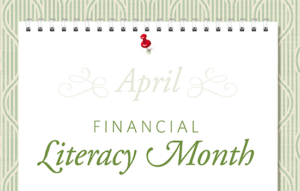 April was first recognized as Financial Literacy Month in the United States in April 2004. This was an effort originated by the National Endowment for Financial Education (NEFE). Both the U.S. Senate and House of Representatives have passed resolutions in recent years, recognizing this month and promoting the ideals of a financially literate society. Increasingly, more organizations, companies, and governmental agencies have expressed support and created resources to encourage this nationwide initiative. It’s good to have this area of our lives encouraged in this healthy way. We can take three steps to make financial literacy a part of our everyday lives.
April was first recognized as Financial Literacy Month in the United States in April 2004. This was an effort originated by the National Endowment for Financial Education (NEFE). Both the U.S. Senate and House of Representatives have passed resolutions in recent years, recognizing this month and promoting the ideals of a financially literate society. Increasingly, more organizations, companies, and governmental agencies have expressed support and created resources to encourage this nationwide initiative. It’s good to have this area of our lives encouraged in this healthy way. We can take three steps to make financial literacy a part of our everyday lives.
Awareness
It starts with awareness: awareness of the need for a healthy understanding and use of our financial resources and subsequent stewardship. We must examine our money habits. Why do we think the way we do about money? Who has influenced our thoughts and habits on how we utilize these resources? We must not be afraid to think critically about this subject and our behavior in this area. I do not mean critically, in a negative way necessarily, just a discerning and intentional examination of this subject.
Before we can begin to grow our understanding of healthy money habits, we need to know where we are. We need a baseline from which to measure, or we will not be able to tell if we are improving. This is especially important for parents. We must have a clear understanding of why and how we handle our finances before we can properly begin to teach and demonstrate for our children how they can have a healthy relationship with money.
Conversations
Once we have a clear, or at least clearer, awareness of why and how we do the things we do with money, we can begin to share principles and practices we’ve learned with family and friends. Finances remain a “taboo topic” in some relationship circles. Hopefully, these conversations will center around best practices and where or how we’ve learned to be wiser with money management. If we expect young people to practice healthy financial management, but we never share what that means, how can we expect the next generation to be wise with their blessings and resources? The amounts don’t matter; the principles of healthy stewardship do.
What are those healthy stewardship principles? First, we must learn to spend less than we make. That’s the foundational formula for building wealth. But this conversation is not primarily about wealth. That must not become the universal financial goal. Still, we must enact this principle to build up enough to share in ways that bring us joy and hopefully glorify God. That equation helps us build margin to accomplish our “higher” financial goals, our stewardship responsibilities.
We cannot be afraid to share our failures and successes in financial matters with those we care about. If we want them to succeed, we must start the conversation. Talking about these things makes no difference, though, if we fail to put these principles into action.
Action
If we never implement these healthy financial principles, what good was the study or conversations? Words do not change our bank accounts. Words do not change our work habits to bring more financial resources. We must practice the principles we learn from Scripture about financial stewardship. We have to implement the practices we share with one another.
Some may have expected this article to spell out steps or list resources for living a financially successful life—how-to for money management. The Board of Retirement does have resources to help in that way, but the aim of this article is to make us aware of our need for financial literacy and provide a general starting point for how to get there.
If you have questions, or if you are looking for resources about specific financial topics, contact our office and we will be glad to assist in any way we can.
Awareness + Conversation + Action = Change.
Make it a positive change.
**Adapted from ONE Magazine

